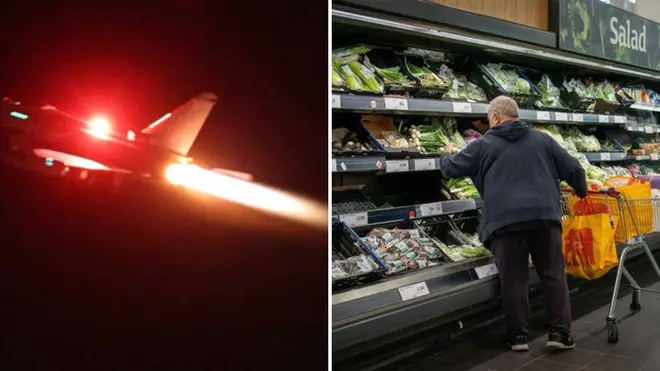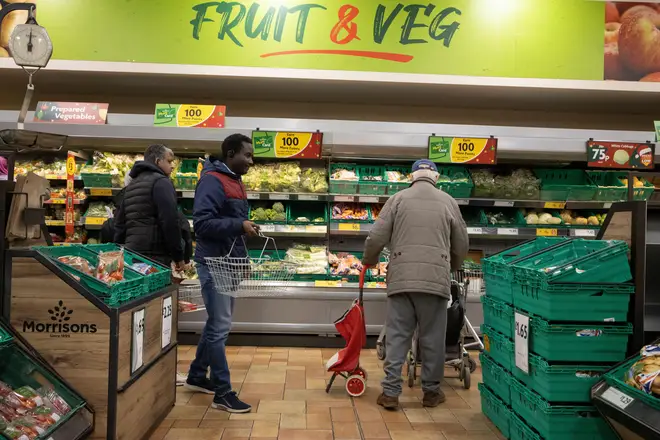
Ben Kentish 10pm - 1am
12 January 2024, 13:29 | Updated: 12 January 2024, 17:05

After the UK and the US launched airstrikes on military bases controlled by the Iranian-backed Houthi rebels in Yemen on Wednesday night, LBC looks at how the volatile situation could affect the lives of people in the UK.
For weeks, Houthi fighters have been attacking commercial vessels passing through the Bab El-Mandeb Strait in the Red Sea, a trade route which accounts for around 12% of global shipping. Earlier this week the group targeted a British warship in the region.
But how could the disruption of commercial activity in the region, the subsequent airstrikes executed by the UK and US, and Houthi warnings that they would retaliate affect the lives of ordinary people?
LBC breaks down three potential implications.

A host of household names, including Next, Lidl and Ikea, have noted an impact on deliveries as a result of Houthi attacks, resulting in potential delays and supply shortages.
This is because ships are being forced to take a longer route to the UK and other western countries, going around the Cape of Good Hope at the very south of the continent of Africa, rather than through the Bab El-Mandeb Strait and Suez Canal.
Indeed, supply chain issues have already hit the production of Teslas, with factory workers in Berlin being stood down due to a lack of available parts.
Tom Holder from the British Retail Consortium told LBC that these delays could frustrate efforts to reduce the amount already cash-strapped Brits are paying at the supermarket.
"Clearly, it is going to affect margins after two very challenging years that we’ve had with the cost of living and high inflation," he said.
"It is going to be a real frustration to retailers at the moment who just want to get back to business as usual - and it was looking for a time as though we were heading that way… [Supermarkets] can’t absorb all the cost rises at the moment."

Earlier in the week, the Bank of England published a promising economic forecast that suggested it could reach its inflation target of 2% by April, prompting speculation that interest rates could soon begin to tumble.
However, the inflationary impact of a disruption to global supply chains has led to the possibility that the Bank may actually need to raise interest rates again - potentially pushing up mortgage payments for families across the country.
Stephen Barber, an economist and professor of global affairs at the University of East London, told LBC that the Houthi attacks had resulted in a “noticeable impact” on the rate of inflation.
"The pressure returns to the Bank of England to maintain or indeed increase interest rates, whereas we had expected interest rates to ease off in 2024," he said.
"Inflation is still double the Bank of England’s target rate, and we’ve seen economic figures coming out this morning which shows, whilst the economy is growing, it is only doing so very slightly. [Growth] is very, very fragile. Once you put another inflationary effect into that, it puts pressure on interest rates and economic recovery."

Ever since Hamas’ attack on Israel on October 7, there has been a heightened focus on how events in the Middle East could increase the domestic terrorist threat.
The UK’s terror threat level is set by the Joint Terrorism Analysis Centre (JTAC) and MI5. Currently, the threat is judged to be ‘Substantial’, the third highest level, meaning an attack is ‘likely’. This assessment is based on both specific domestic intelligence as well as the international context, including the potential fallout from the UK’s airstrikes in Yemen.
After last night’s bombings, a senior Houthi official, Abdulsalam Jahaf, was quoted as saying the group had reached a moment of "holy jihad", and a "decisive historical stage with which God honoured us to humiliate America, Britain and Israel."

Lewis Goodall: Houthi attacks will cost 'billions of dollars', which will come out of 'your pocket.'
Responding to these comments. Nick Aldworth, former National Counter Terrorism Co-ordinator, told LBC: "Historically, actions, particularly in the Middle East, can be used as a call to arms for people inside the UK and western Europe generally, and that can have an impact on people’s motivations to commit terrorism inside the UK."
Mr Aldworth added: "There will be some people who hear that and will see that as some sort of call to a glorious uprising. The essence of jihad, in that context, is about an armed struggle against those they see as aggressors."
He stressed that Thursday night’s airstrikes alone may not lead to an increase in the terror threat level - but he cautioned that "some may well still be motivated by that [the call to Jihad], and see it as a perverse validation of the thoughts they might have already had about committing offences inside the UK - we can’t rule out that being a potential trigger for that sort of person."